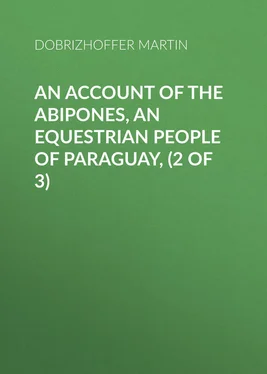Martin Dobrizhoffer - An Account of the Abipones, an Equestrian People of Paraguay, (2 of 3)
Здесь есть возможность читать онлайн «Martin Dobrizhoffer - An Account of the Abipones, an Equestrian People of Paraguay, (2 of 3)» — ознакомительный отрывок электронной книги совершенно бесплатно, а после прочтения отрывка купить полную версию. В некоторых случаях можно слушать аудио, скачать через торрент в формате fb2 и присутствует краткое содержание. Жанр: foreign_antique, foreign_prose, на английском языке. Описание произведения, (предисловие) а так же отзывы посетителей доступны на портале библиотеки ЛибКат.
- Название:An Account of the Abipones, an Equestrian People of Paraguay, (2 of 3)
- Автор:
- Жанр:
- Год:неизвестен
- ISBN:нет данных
- Рейтинг книги:3 / 5. Голосов: 1
-
Избранное:Добавить в избранное
- Отзывы:
-
Ваша оценка:
- 60
- 1
- 2
- 3
- 4
- 5
An Account of the Abipones, an Equestrian People of Paraguay, (2 of 3): краткое содержание, описание и аннотация
Предлагаем к чтению аннотацию, описание, краткое содержание или предисловие (зависит от того, что написал сам автор книги «An Account of the Abipones, an Equestrian People of Paraguay, (2 of 3)»). Если вы не нашли необходимую информацию о книге — напишите в комментариях, мы постараемся отыскать её.
An Account of the Abipones, an Equestrian People of Paraguay, (2 of 3) — читать онлайн ознакомительный отрывок
Ниже представлен текст книги, разбитый по страницам. Система сохранения места последней прочитанной страницы, позволяет с удобством читать онлайн бесплатно книгу «An Account of the Abipones, an Equestrian People of Paraguay, (2 of 3)», без необходимости каждый раз заново искать на чём Вы остановились. Поставьте закладку, и сможете в любой момент перейти на страницу, на которой закончили чтение.
Интервал:
Закладка:
Galen, in his work on the preservation of the health, boldly and truly asserts that too great repose of body is highly prejudicial, but moderate and proper motion, on the other hand, of the utmost utility. This is consonant to the words of Celsus, Lib. I. c. 1. Ignavia corpus hebetat, labor firmat; illa præmaturam senectam, iste longam adolescentiam reddit. You cannot therefore be surprized that the Abipones are athletic like the Macrobii. They are in continual motion. Riding, hunting, and swimming are their daily employments. War, either against men or beasts, occasions them to take very long excursions. Their business is to swim across rivers, climb trees to gather honey, make spears, bows, and arrows, weave ropes of leather, dress saddles, practise every thing, in short, fatiguing to the hands or feet. But if they indulge themselves with an intermission of these employments, they ride horseraces for a sword which is given to him who reaches the goal first. Another very common game amongst the Abipones is one which they play on foot. The instrument with which it is performed is a piece of wood about two hands long, rounded like a staff, thicker at the extremities and slenderer in the middle. This piece of wood they throw to the mark, with a great effort, in such a manner that it strikes the ground every now and then, and rebounds, like the stones which boys throw along the surface of a river. Fifty and often a hundred men stand in a row and throw this piece of wood by turns, and he who flings it the farthest and the straightest obtains the sword.
This game, which from boys they are accustomed to play at for hours together, amuses and fatigues them with wonderful benefit to their health. The same piece of wood which serves both as an instrument of peace and war, is made formidable use of by many of the savages to crush the bodies of their enemies and of wild beasts. The Abipones hate to lead the life of a snail, idle and listless, and consequently do not undergo a swift and miserable decay, like those who are stupefied with sloth, confined to their bed, table, or gaming-table, and seldom stir out into the street or country. The Abiponian women, though debarred from the sports and equestrian contests of the men, have scarce time to rest or breathe, so much are they occupied day and night with the management of their domestic affairs. Hence that masculine vigour of the females in producing almost gigantic offspring, hence their strength and longevity.
The food also to which the Abipones are accustomed, in my judgment contributes not a little to prolong their lives. What Tacitus says of the ancient Germans is applicable to them: Cibi simplices, agrestia poma, recens fera, aut lac concretum, sine apparatu, sine blandimentis expellunt famem . They feed, as chance directs, upon beef, or the flesh of wild animals, mostly roasted, but seldom boiled. If the plain afford them no wild beasts to hunt, the water will supply their hunger with various kinds of fish besides otters, ducks, capibaris, &c. From the air also they receive birds that are by no means to be despised, and from the woods divers fruits, to appease the cravings of appetite. Should all these be wanting, roots concealed beneath the ground or the water are converted into food. Necessity alone will induce them to taste fishes, though excellent. Tigers' flesh, spite of its vile odour, is in such esteem amongst them that if one of them kills a tiger, he cuts it into small portions, and divides it amongst himself and his companions, that all the hordesmen may share in what they think so delightful a delicacy. It is an old complaint amongst physicians that new seasonings of food imported from the new world have brought with them new diseases into Europe. This complaint cannot affect the Abipones, who are unacquainted with seasonings, and feed upon simple fare. They detest vinegar; and salt, though as fond of it as goats, they are seldom able to obtain, their land producing neither salt nor salt-pits. To remedy this deficiency they burn a shrub called by the Spaniards vidriera , and sprinkle its ashes, which have a saltish taste, on meat and on tobacco leaves, previously chewed and kneaded together with the saliva of old women. But as many of the Abiponian hordes are destitute of this shrub, the ashes of which are used for salt, they generally eat their meat unsalted. No one ever denied that the moderate use of salt is wholesome, for it sucks up noxious humours, and prevents putrefaction: but the too frequent use of it deadens the eye-sight, exhausts the better juices, and creates acrid ones injurious both to the blood and skin, by which means physicians say that the urinal passages are frequently hurt. We found in Paraguay that horses, mules, oxen, and sheep fattened only in those pastures where plenty of nitre, or some saltish substance was mixed with the grass; if that be wanting the cattle very soon become ragged and lean. Meat sprinkled with salt will keep a long time, but the more plentifully it is salted the sooner it stinks and putrefies, the moisture into which salt dissolves united with heat accelerating putrefaction. Beef hardened by the air alone, and fish dried with nothing but smoke, will keep many months without a grain of salt, as I and all the savages know from experience. When we sailed back from Paraguay to Europe our chief provisions consisted of meat part salted, part dried by the air alone. The latter from having no salt in it remained well tasted and free from decay till we reached the port of Cadiz, while the other soon putrefied and was thrown into the sea even by the hungry sailors. Now hear what inference I draw from all this. Since the Abipones, though they use salt but seldom and in small quantities, are generally healthy and long-lived, I cannot but suspect that abstinence from salt conduces more to the well being of the body than the too unsparing use of it.
That diet regulating both meat and drink is the source of a late old age, firm health, and long life is unanimously agreed by all the great physicians and philosophers. I have repeatedly affirmed that the Abipones are vigorous, and long-lived, yet who can call them studious of diet? They eat when, as much, and as often as they like. They have no fixed hours for dinner or for supper, but if food be at hand will dine as soon as they wake. Hungry at all hours they eat at all hours; and an appetite will never be wanting if they have wherewith to exercise it upon. You would think that the more they devour the sooner they are hungry. They are voracious, and, like the other Americans, cram themselves with flesh, but without injury to their health; for their stomachs, which will bear both a great quantity of food, and long abstinence from it, are weakened neither by gormandizing nor by extreme hunger. They undertake JOURNEYS of many months unfurnished with any provision. A sufficiency of proper food is often not to be met with on the way, either from the want of an opportunity of hunting, or from the unintermitting haste with which the desire of surprizing, or necessity of flying the enemy obliges them to pursue their journey. Yet an empty belly and barking stomach never do them any harm, nor even prevent them from cheerfully conversing to still the sense of hunger. On such occasions you see them betray no sign of impatience, nor complain of any indisposition of body. I do not pretend to deny that temperance in eating and drinking is the parent of longevity, and gluttony that of disease and premature death; knowing that many saintly hermits have prolonged their lives to an hundred years, spite of continual fasting, and that perhaps they would have attained a still greater age had they taken more nourishment. Yet I scarce wonder that these Christian heroes lived so long, upon poor and sparing diet, because they were always celibate, and remained fixed to one spot without ever experiencing great fatigue. Neither, on the other hand, does it surprize me that the Abipones should enjoy such singular longevity, united with so much voracity; for they, who are all married, weary themselves with running, hunting, swimming, riding, and military exercises, and consequently to recruit their strength, require, and easily digest a greater quantity of food: for their vigour would decay and their great bodies languish were they not frequently reinvigorated with plenty of victuals. The Abipones are daily obliged to assuage their thirst with river or marsh water, which is generally tepid or warm, very seldom cold, and not always quite fresh: might not this be a circumstance conducive to health? For physicians prefer river or rain water to that of a spring, because it is lighter and impregnated with fewer noxious particles. The Chinese never taste a drop of cold water. Many think that snow and ice-water cause divers disorders. Snow, ice, springs of water, and subterranean cells for cooling liquors are no where to be found in the territories of the Abipones, who are also unacquainted with wine expressed from grapes, or burnt out of fruits by chemic art. But though they use nothing but water to quench their thirst, yet on the birth of a child, the death of a relation, a resolution of war, or a victory, they assemble together to drink a strong liquor made of honey or the alfaroba infused in water, which when fermented causes intoxication, but taken moderately is of much service to the health. For it is universally thought that the alfaroba and wild honey conduce much to prolong life and confirm the health. The Abipones are in the habit of drinking honey, in which the woods abound, very frequently; what if we call this a cause of their vigour and longevity? Both however they partly owe to the use of the alfaroba, which they either eat dried, or drink in great quantities, as wine, when fermented in water by its own native heat. Taken either way it possesses singular virtue, for it restores the exhausted strength, fattens the body, clears and refreshes the breast, quickly and copiously discharges the bladder by its diuretic property, radically cures many disorders, is extremely efficacious against the stone, and affords a strong alleviation to nephritic diseases. Persons who had tried it assured me of its possessing those virtues. More robust and healthy horses are no where to be found throughout the wide extent of Paraguay, than those born in the territory of St. Iago del Estero, because they feed principally upon the alfaroba.
Читать дальшеИнтервал:
Закладка:
Похожие книги на «An Account of the Abipones, an Equestrian People of Paraguay, (2 of 3)»
Представляем Вашему вниманию похожие книги на «An Account of the Abipones, an Equestrian People of Paraguay, (2 of 3)» списком для выбора. Мы отобрали схожую по названию и смыслу литературу в надежде предоставить читателям больше вариантов отыскать новые, интересные, ещё непрочитанные произведения.
Обсуждение, отзывы о книге «An Account of the Abipones, an Equestrian People of Paraguay, (2 of 3)» и просто собственные мнения читателей. Оставьте ваши комментарии, напишите, что Вы думаете о произведении, его смысле или главных героях. Укажите что конкретно понравилось, а что нет, и почему Вы так считаете.












